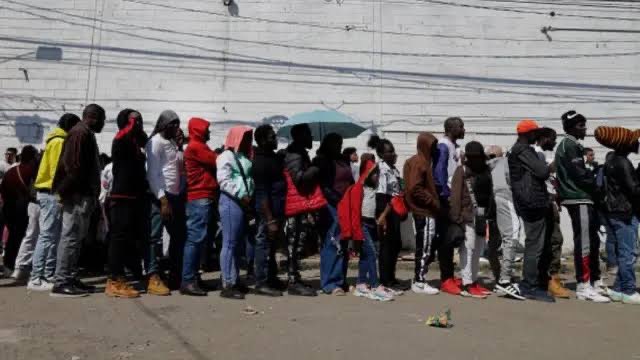A total number of 201 Nigerians are in the United States (U.S.) immigration camps set to be deported to Nigeria, in line with President Donald Trump’s immigration policy, while 85 of them have been cleared for immediate eviction from the country.
The U.S. Ambassador to Nigeria, Richard Mills Jr., noted that among the first batch of deportees to Lagos are those serving jail terms in U.S. prisons.
He spoke during a meeting with the Minister of State for Foreign Affairs, Bianca Odumegwu-Ojukwu, at her office. The U.S. President has been fulfilling his campaign promise to deport illegal immigrants.
“There wouldn’t be room for whether it should be in Port Harcourt or Abuja. The first group will be convicted prisoners, those who committed crimes and are in U.S. prisons, who have clearly violated U.S. immigration laws.”
Odumegwu-Ojukwu insisted that the U.S. government must follow the laid down conventions on the deportation of persons in repatriating immigrants.
She urged the U.S. to find a way of ameliorating the trauma of those to be deported, including allowing them ample opportunity to retrieve their assets in America.
Also, bemoaned the emotional and financial pains that many Nigerians in the U.S. were already experiencing since the Trump Administration announced the plans.
She stated that the effect was far reaching even to the hinterlands of Nigeria where for instance, several families, including children relied on remittances from the U.S. for their survival and education.
“At the moment, we’re told that about 201 Nigerian nationals are in U.S. immigration camps and about 85 have been cleared for deportation. Will there be any way of ameliorating their pains?”
“We are asking as a country whether they will be given ample time to handle their assets or will they just be bundled into planes and repatriated? It will really be traumatic, especially for those who have not committed any violent crime”.
The U.S. envoy also spoke on the African Growth and Opportunity Act (AGOA). I think this (Trump) Administration will concentrate more on trade and commerce. This relationship is strong and we want it sustained”.
Odumegwu-Ojukwu expressed concern over the likely suspension of the Drop Box Visa System by the U.S. government, and urged Washington DC to reconsider the suspension of the policy such that Nigerians who had been travelling to the US for genuine reasons would not have to suffer unduly in procuring U.S. visa.
The minister further called for the injection of more impetus in the bilateral relations between Abuja and Washington DC. She called for the reactivation of the ‘Silent Secretariat’ where the two countries assessed their bilateral relations.
She explained that the foreign policy of the President Bola Ahmed Tinubu-led administration, which focuses on democracy, development, demography and Diaspora, was on course. She restated the government’s commitment to citizen diplomacy.
“We have some of them in prisons abroad. The administration is concerned about their welfare.”
She said that Nigeria needed strategic partnerships to tackle the demographic issue of unemployment which triggers illegal migration known as Japa syndrome in Nigerian parlance.
She said it was in line with the 4-Ds foreign policy of Nigeria that despite the Sahel crisis, the free movement policy of the Economic Community of West African States (ECOWAS) was still in place.
According to Mills, the Drop Box Visa Policy had not been suspended but whenever there is a change in administration, policies are renewed.
He assured that the position of the new US Government on the USAID, Drop Box Visa system and others would be known in due course.
He acknowledged that the USAID did some specific things, particularly life-saving in the health sector, and humanitarian issues like mother-child.




